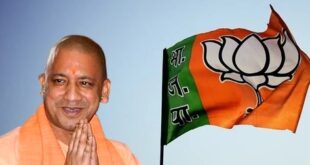Dr. Utkarsh Sinha
 Kathmandu’s Mayor, Balen Shah (Balendra Shah), has captured the imagination of Nepal’s youth with his vibrant energy, background as a rapper, and image as an independent leader challenging the entrenched political establishment. Since his election as mayor in 2022, he has emerged as a symbol of anti-corruption and progressive politics, distinct from traditional parties. However, as of 2025, amid Nepal’s ongoing political turmoil, his leadership style has drawn significant criticism. His anti-India rhetoric, political immaturity, and the resulting instability threaten Nepal’s democratic framework, potentially paving the way for resurgence of monarchist sentiments.
Kathmandu’s Mayor, Balen Shah (Balendra Shah), has captured the imagination of Nepal’s youth with his vibrant energy, background as a rapper, and image as an independent leader challenging the entrenched political establishment. Since his election as mayor in 2022, he has emerged as a symbol of anti-corruption and progressive politics, distinct from traditional parties. However, as of 2025, amid Nepal’s ongoing political turmoil, his leadership style has drawn significant criticism. His anti-India rhetoric, political immaturity, and the resulting instability threaten Nepal’s democratic framework, potentially paving the way for resurgence of monarchist sentiments.
Anti-India Stance: Fuelling Cultural and Regional Tensions
Balen Shah’s anti-India stance has become a defining and contentious aspect of his leadership, straining Nepal-India relations. In 2023, he imposed a ban on Indian films in Kathmandu, particularly targeting the Bollywood movie Adipurush. He objected to the film’s depiction of Sita as “India’s daughter,” arguing it undermined Nepal’s cultural identity, as Nepalis believe Sita was born in Janakpur, Nepal. This ban sparked widespread controversy, disrupted the screening of Bollywood films, and was later deemed illegal by the Patan High Court. Initially, Balen defied the court’s order and publicly labelled Nepal’s central government and judiciary as “slaves of India” on Facebook. Though he eventually lifted the ban, this episode underscored his anti-India posture.
Beyond cultural disputes, Balen has escalated tensions by displaying a “Greater Nepal” map in his office, which includes parts of India such as Uttarakhand, Himachal Pradesh, Uttar Pradesh, Bihar, Darjeeling, and Siliguri as Nepali territory. This map was presented as a counter to India’s “Akhand Bharat” concept, but Nepal’s central government dismissed it as impractical, noting that a mayor’s jurisdiction is limited to municipal affairs. Such irredentist claims risk inflaming border disputes and destabilizing bilateral relations. Balen has also repeatedly accused India of interfering in Nepal’s internal affairs on public platforms and social media, further widening the political rift between the two nations.
This stance is perilous given Nepal’s geopolitical realities. Nepal relies heavily on India for economic, security, and strategic cooperation. Balen’s anti-India rhetoric not only undermines this partnership but also risks pushing Nepal closer to China, disrupting the regional power balance.
In 2025, as youth protesters tout Balen as a potential prime ministerial candidate, his anti-India position becomes even more concerning. Can Nepal afford a leader who provokes conflict with its closest neighbor?
Political Immaturity: Zeal Over Pragmatism
Balen Shah’s popularity is rooted in the enthusiasm of Nepal’s youth, but his leadership style betrays a troubling immaturity. As mayor, he has taken some commendable steps, such as outsourcing waste management to private companies, introducing “Textbook-Free Fridays” in schools, and livestreaming municipal council meetings. However, his confrontational and rigid approach has sparked numerous controversies. His bulldozer campaign, aimed at demolishing illegal constructions, often targeted roadside vendors with excessive force, leading to widespread protests. Human Rights Watch criticized these actions as heavy-handed, and Balen was eventually forced to provide alternative arrangements for affected vendors.
His immaturity is also evident in his clashes with the central government and other institutions. For instance, his decision to remove construction materials from Tribhuvan International Airport without authorization led to legal notices and court intervention. His infamous threat to burn down Singha Durbar, Nepal’s administrative headquarters, further highlights his lack of political acumen.
Balen’s frequent fiery social media outbursts suggest a sense of power intoxication. During the 2025 youth protests, when he was called upon to lead an interim government, he reportedly failed to answer the call, signaling a lack of seriousness.
Such immaturity could prove disastrous at the national level. Nepal, with its ethnic, regional, and economic diversity, requires a mature and pragmatic leader. Balen’s experience is largely confined to local governance, and his rigid style risks plunging the country into chaos.
The Shadow of Monarchy: Instability Breeds Opportunity
While Balen Shah does not explicitly support monarchy—indeed, in 2025, he imposed a fine of NPR 7,93,000 on former King Gyanendra Shah for damages caused during pro-monarchy protests his immaturity and divisive policies could inadvertently create fertile ground for monarchist revival. Nepal already has an active monarchist faction, and in 2025, thousands have rallied in support of the former king during his district tours.
Populist leaders like Balen, alongside figures like Rabi Lamichhane and Harka Sampang, exploit democratic weaknesses, but their failure to deliver could drive disillusioned citizens toward monarchy as a symbol of stability.
A Reddit discussion even pondered whether Balen’s supporters would back him if he endorsed monarchy, highlighting this latent risk. His anti-India policies could also invite foreign interference, particularly from the United States or China, further empowering monarchists.
Conclusion: The Need for Mature Leadership
Balen Shah’s popularity reflects the aspirations of Nepal’s youth, but his anti-India stance, political immaturity, and the resulting instability pose grave risks to the nation. His leadership could exacerbate regional tensions, spark internal chaos, and provide monarchists an opportunity to regain influence. Nepal needs a leader who is inclusive, balanced, and mature—one who fosters cooperation with neighbors like India, not confrontation. Youthful zeal is valuable, but national interest must take precedence. The time has come for Nepal to strengthen its democratic foundations, lest history repeat itself with a return to instability or monarchy.
(Author is a senior journalist and expert of International Politics)
 Jubilee Post News & Views
Jubilee Post News & Views




